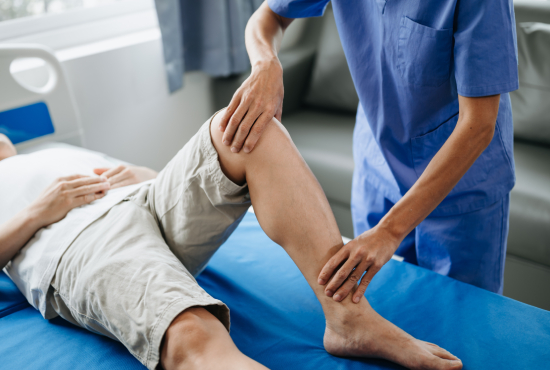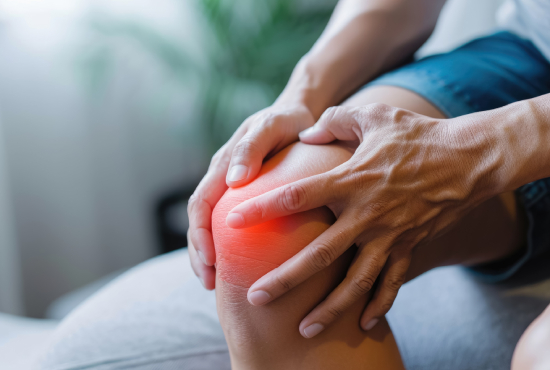Introduction to Knee Pain Physiotherapy
Effective Solutions for Knee Pain through Expert Physiotherapy
Knee pain is a common ailment that affects individuals of all ages, impacting mobility and quality of life. Orthocure offers specialized physiotherapy for knee pain tailored to each patient’s unique condition, from sports injuries and arthritis to post-surgical recovery. Our expert knee physiotherapists employ various practical techniques, including manual therapy, tailored exercises, and advanced modalities, to help reduce pain, restore function, and prevent future injuries. Whether recovering from an ACL tear or managing chronic knee arthritis, our comprehensive approach ensures personalized care that addresses your knee pain’s symptoms and underlying causes.

Understanding Knee Pain Challenges
Navigating the Complexities of Knee Pain
Knee pain can arise from various factors, requiring a nuanced approach for effective treatment.
Common in older adults, leading to conditions like arthritis.
Such as ACL tears or meniscus damage, are prevalent in active individuals.
Retaining full function after procedures like knee replacements is essential.
Ongoing management is needed for persistent issues like rheumatoid arthritis.
Immediate care is required to minimize damage from sprains or fractures.
Resulting from repetitive stress or poor biomechanics.

Benefits of Physiotherapy for Knee Pain
Transformative Benefits of Physiotherapy for Managing Knee Pain
Physiotherapy offers a range of benefits for those suffering from knee pain, enhancing life quality by:
Restoring Mobility and Flexibility
Exercises and stretches improve joint movement, aiding daily activities.
Reducing Pain and Inflammation
Techniques like ice therapy, ultrasound, or TENS provide relief.
Strengthening Knee Muscles
Targeted exercises strengthen muscles supporting the knee, reducing injury risk.
Improving Functional Abilities
Therapy helps patients confidently return to sports or activities.
Types of Knee Pain Addressed
Comprehensive Care for Diverse Knee Conditions

Orthocure’s physiotherapy addresses a wide array of knee conditions, each treated with specialized care:
Sports Injuries
Tailored recovery plans for athletes.
Degenerative Diseases
Long-term strategies for conditions like osteoarthritis.
Post-operative Care
Rehabilitation following knee surgery ensures a return to functionality.
Acute and Chronic Pain Management
Effective solutions for sudden and persistent knee pain.
The Orthocure Approach to Knee Pain
Our Four-Point Protocol for Managing Knee Pain
Scientific Analysis and Diagnosis
We begin with a detailed assessment to identify the specific causes of knee pain.
Pain Management During Treatment
Utilizing modalities to alleviate pain while addressing the root causes.
Treatment of Underlying Conditions
Focused interventions for arthritis or post-surgical healing.
Maintenance and Preventive Care
Ongoing support and preventive strategies to sustain knee health and prevent re-injury.
FAQs on Physiotherapy for Knee Pain
Physiotherapy can be highly effective for treating knee pain by reducing pain and inflammation, increasing range of motion, strengthening the muscles around the knee, and improving overall function. Tailored treatment plans may include manual therapy, exercise therapy, and advice on knee care and lifestyle modifications to prevent future problems. Physiotherapists work to address both the symptoms and the root causes of knee pain, offering a comprehensive approach to recovery.
The frequency of physiotherapy sessions for knee pain varies depending on the severity of the condition and the specific treatment plan. A physiotherapist might recommend sessions once or twice weekly for several weeks. As symptoms improve, the frequency may decrease. Continuous evaluation during sessions helps to adjust treatment plans accordingly to ensure the best outcomes.
While physiotherapy cannot cure arthritis, it can significantly alleviate the symptoms associated with it, such as pain, stiffness, and reduced mobility. Regular physiotherapy sessions focus on exercises that help maintain joint function, improve strength, and minimize discomfort. The management strategies provided by physiotherapists also aim to slow the progression of the disease.
Physiotherapy for knee pain typically involves various exercises tailored to the individual’s condition. These include stretching exercises to improve flexibility, strengthening exercises to build muscle support around the knee, and low-impact aerobic conditioning like cycling or swimming. The physiotherapist will demonstrate and guide patients on performing these exercises safely and effectively.
Yes, physiotherapy, such as a knee replacement or ACL repair, is crucial after knee surgery. It helps restore strength, flexibility, and mobility and speeds up recovery. Physiotherapy post-surgery includes exercises to reduce swelling and pain, regain range of motion, and gradually return to everyday activities and sports.
A knee physiotherapist specializes in assessing, diagnosing, and treating knee injuries and conditions. They develop customized treatment plans that include manual therapy, specific exercises, and sometimes modalities like ultrasound or laser therapy to address pain, swelling, and mobility issues. Their expertise is crucial in both acute and chronic knee conditions.
Physiotherapy plays a significant role in preventing knee injuries, especially in athletes or physically active individuals. By strengthening the muscles around the knee and improving flexibility and balance, physiotherapy helps to stabilize the knee joint and reduce the risk of injury. Preventive advice on sports techniques and proper footwear is also provided.
Physiotherapy effectively treats sports-related knee injuries by reducing pain, restoring function, and preventing future injuries. Treatments focus on specific exercises tailored to the patient’s eagerness to return to sports activities.
Many physiotherapy exercises for knee pain can be safely performed at home as part of an ongoing treatment plan. Physiotherapists often give patients detailed instructions and demonstrations on performing exercises at home to continue their rehabilitation and manage pain effectively.
Physiotherapy is crucial for recovery after an ACL tear, helping to restore knee stability, strength, and function. Treatment plans focus on reducing swelling, improving range of motion, strengthening surrounding muscles, and gradually introducing activities crucial for returning to sports or daily life activities.
Physiotherapy is highly effective in managing knee pain in elderly patients. It focuses on gentle, safe exercises that improve mobility, strength, and balance, thus enhancing their quality of life and independence. Physiotherapy also educates elderly patients on managing pain and efficiently performing daily activities.
During your first visit for knee pain, the physiotherapist will assess your overall health and medical history and thoroughly examine your knee. They will discuss your symptoms, mobility issues, and any specific incidents that might have led to the pain. Based on this assessment, they will develop a personalized treatment plan.
Physiotherapy for knee pain is a non-invasive treatment with minimal risks. Occasionally, patients might experience mild soreness or swelling after exercises, which are typically temporary and part of the normal healing process. Physiotherapists ensure exercises are performed within safe limits to avoid any adverse effects.
Yes, depending on the individual’s needs and condition, physiotherapy can effectively be combined with other treatments such as medication, injections, or even alternative therapies like acupuncture. This integrated approach often results in better pain management and faster recovery.

